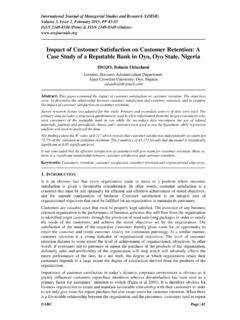Transcription of 5 Core Principles of Customer Care - crmxchange.com
1 5 core principles of customer care Want to improve Customer satisfaction ? Adopt these five core Customer care Principles . Overview W. hat company isn't looking to improve Customer satisfaction in today's highly competitive marketplace? Customers who give you a 5 on a scale of 1 to 5 are six times more likely to buy from you again than those who only give you a score of Customers are the lifeblood of an organization. Their satisfaction is closely linked to retention (and its less attractive sibling, churn), repeat business, and the positive word of mouth that attracts new customers. To satisfy customers, you simply have to resolve their issues and do it quickly. Easier said than done. At minimum, customers expect to be listened to and understood, taken seriously, treated with respect, and to receive timely action. To earn top Net Promoter scores or 5s on a CSAT survey, you have to do more. In this eBook, we'll talk about some core Principles of Customer care that drive strong Customer satisfaction scores.
2 There are, of course, essential skills that should be demonstrated by anyone in a frontline Customer service position, and impact Learning Systems has a lot of information to offer you in that arena. But for now, our focus is on five key Principles that are relevant to anyone who manages or trains a Customer service team. Copyright 2014, impact Learning Systems International a division of Miller Heiman 1. Introduction The following Principles derive from work performed with many organizations to assist them in their efforts to establish a culture of world- class service. The Principles outlined here are key to that endeavor . regardless of industry. Of course it's difficult to pare it down to only five Principles certainly there are many more that can be considered but this should provide a good starting point for anyone trying to build and maintain a strong Customer care culture in their own organization. Did You Know?! If you can resolve an issue or fix a problem of a complaining Customer , it is 80% likely that the Customer will come back and make a purchase again.
3 Copyright 2014, impact Learning Systems International a division of Miller Heiman 2. Customer care Defined The concept of Customer care needs to be distinguished from skills.. There are some essential skills that should be demonstrated by anyone in a frontline Customer care position, and impact Learning Systems certainly has a lot of information to offer you in that arena, but for now, let's focus on some key Principles that are relevant to anyone who manages or trains a Customer care team, as well as to the Customer care representatives themselves. After each principle, some relevant questions to reflect on will be introduced. The aim is to help you assess whether this principle is being put into practice in your own organization. Let's take a look. Customer care (noun) The work of looking after customers and ensuring their satisfaction with your business and its goods or services . Copyright 2014, impact Learning Systems International a division of Miller Heiman 3.
4 Customer care Principle #1. The first principle is that to customers, frontline representatives are the company. Customers don't usually know or see what goes on behind the scenes, so their impression of your organization stems from what we call Customer touchpoints. These Customer touchpoints occur any time a Customer comes into contact with your company and uses that experience to form an impression of your organization. Frontline employees, whether they're communicating face-to-face, on the telephone, or via e-mail, are in direct and constant communication with your customers. An investment in the skills and knowledge of these employees is very much an investment in the Customer experience. To ensure that these Customer touchpoints are leaving a favorable impression, here are a few questions for you to consider: . Do frontline employees view themselves as ambassadors of the organization? . Are they trained in communication skills? . Are they empowered to do the needful (within reason) for customers?
5 Are you aware of the various Customer touchpoints that occur in your organization? Copyright 2014, impact Learning Systems International a division of Miller Heiman 4. Customer care Principle #2. Studies have shown that a strong link exists between employees' job satisfaction and the quality of Customer service those employees provide. (Really no surprise there.) Customer care whether that means selling shoes or fixing servers is an intrinsically rewarding profession. Simply put, it feels good to be of service to someone, to make something good happen to another person. This is the kind of attitude that motivates employees to create a strong culture of Customer care . But it doesn't typically happen unless the employees themselves feel valued by their company and satisfied with their jobs. It may sound obvious, but it's worth noting: If employees aren't satisfied on the job, they're usually not motivated to demonstrate a high level of Customer care . At best, they'll do just enough to get by.
6 The following are some key questions to ask yourself about employee satisfaction at your organization: . What is the turnover rate for your Customer -facing employees? . How do you measure employee satisfaction and motivation? . When employee satisfaction is low, what do you do about it? . Do performance issues in your organization stem from an employee's attitude or from his or her skill level? Your answers to these questions will tell you what's needed in order to build a culture of strong Customer care . Copyright 2014, impact Learning Systems International a division of Miller Heiman 5. Customer care Principle #3. The third key principle of Customer care is to show customers that they're valued by your company. Many organizations make the mistake of assuming that customers know this. Of course, the most important aspect of showing customers that they're valued is to take care of their needs or requests in a timely, efficient, and correct manner. At each and every Customer touchpoint, maintain a mindset of earning the business and trust of customers.
7 Never take it for granted. But customers have needs that go beyond the transaction. They want to be appreciated and respected. They want to feel that your company's Customer care philosophy is just that: care . So it doesn't hurt to tell them directly. Before ending a call or a face-to-face visit, employees should take a moment to tell the Customer that their business is appreciated. It can go a long way. Here are three questions to keep in mind: . If you were a Customer of your organization, would you feel valued? . When closing a call or other type of Customer transaction, are employees expected to thank customers for their business? . Do Customer -facing employees understand the importance of earning a Customer 's trust and loyalty on an ongoing basis? The good news is, putting this principle into action is usually a pretty simple step. Copyright 2014, impact Learning Systems International a division of Miller Heiman 6. Customer care Principle #4. All too often, companies place a strong emphasis on external Customer care while losing sight of the fact that internal customers matter just as much.
8 Why? Because somewhere down the line, the service you provide to an internal Customer will show up in an external Customer transaction. An internal Customer is any employee who depends on the timing, quality, and accuracy of your work in order for them to succeed in their own work. Those organizations in which a Customer care culture is truly embedded do not make distinctions about internal and external care . Each employee's mission is simply to demonstrate excellence with each and every task. To help you assess the level of internal Customer service in your organization, ask yourself the following questions: . Do your employees know who their internal customers are? . Are employees measured on the service they provide to internal customers? . Do they recognize that everyone in the organization is a service provider? If you feel that you might need work in any of these areas, the next principle can help. Copyright 2014, impact Learning Systems International a division of Miller Heiman 7.
9 Customer care Principle #5. You cannot expect people to perform to expectations until you've given them the knowledge and skills to do just that. If you're serious about embracing a culture of Customer care , you need to educate employees as to what this notion looks like on the job. It shouldn't be taken for granted that employees know what goes into good Customer service internal or external. They may have some good instincts, and they may each take certain measures that they personally feel will provide good service, but this hopeful and hodgepodge approach isn't enough. Providing them training in both your company's Customer care philosophy and in their job-specific service skills is a huge and all-important step. Once employees have been trained, it's essential for them to be held accountable for putting the skills into practice on the job. This, of course, means strong and consistent coaching on an ongoing basis. Finally, once you've trained employees and held them accountable for putting their training into practice on the job, be sure to reward them for their success.
10 Copyright 2014, impact Learning Systems International a division of Miller Heiman 8. Formula for Success Here at impact Learning Systems, we believe that strong performance in the area of Customer care is a matter of a simple formula: Training + Coaching = Success The questions that follow will help you to assess where you stand in those two disciplines: . Do employees know what's expected of them? . Do they have the knowledge, skills, and competencies to provide great service to internal and external customers? . Do supervisors and managers provide regular, constructive, and skilled coaching to employees? . Are employees rewarded for their success? If your answer to any of these questions is no, it's time to take a look at your training and coaching and possibly move them up the priority list. Copyright 2014, impact Learning Systems International a division of Miller Heiman 9. Summary To recap, the five Customer care Principles discussed are as follows: Principle #1: To customers, frontline employees are the company.



